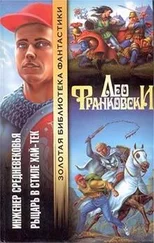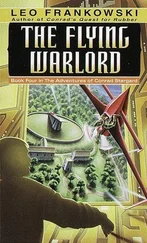Лео Франковски - The High-Tech Knight
Здесь есть возможность читать онлайн «Лео Франковски - The High-Tech Knight» весь текст электронной книги совершенно бесплатно (целиком полную версию без сокращений). В некоторых случаях можно слушать аудио, скачать через торрент в формате fb2 и присутствует краткое содержание. ISBN: , Жанр: Альтернативная история, на английском языке. Описание произведения, (предисловие) а так же отзывы посетителей доступны на портале библиотеки ЛибКат.
- Название:The High-Tech Knight
- Автор:
- Жанр:
- Год:неизвестен
- ISBN:0-345-32763-2
- Рейтинг книги:4 / 5. Голосов: 1
-
Избранное:Добавить в избранное
- Отзывы:
-
Ваша оценка:
- 80
- 1
- 2
- 3
- 4
- 5
The High-Tech Knight: краткое содержание, описание и аннотация
Предлагаем к чтению аннотацию, описание, краткое содержание или предисловие (зависит от того, что написал сам автор книги «The High-Tech Knight»). Если вы не нашли необходимую информацию о книге — напишите в комментариях, мы постараемся отыскать её.
The High-Tech Knight — читать онлайн бесплатно полную книгу (весь текст) целиком
Ниже представлен текст книги, разбитый по страницам. Система сохранения места последней прочитанной страницы, позволяет с удобством читать онлайн бесплатно книгу «The High-Tech Knight», без необходимости каждый раз заново искать на чём Вы остановились. Поставьте закладку, и сможете в любой момент перейти на страницу, на которой закончили чтение.
Интервал:
Закладка:
As the weeks went on, there was a growing pile of finished parts, but that was not as satisfying as watching the buildings going up.
I delayed assembly of the buildings for a good reason. Wood set directly on the ground rots and I wanted our buildings to have masonry foundations and basements.
We couldn't do masonry construction without mortar and we couldn't make mortar without coal.
There was coal in the mine, but the mine was still full of water. Parts for the steam pump were arriving regularly from the Krakowski brothers, and the pump functioned well enough after some reworking, or TLC as the Americans call it, but it all took time.
Oh, we could have used charcoal to make mortar, but that would have been time-consuming, too, and the coal would be there soon.
Getting my way was rarely an easy task. I had to talk and persuade and cajole. I shouted and screamed and pretended to throw temper tantrums. But what helped most was when I dug out my bible and read them the description of the building of Solomon's Temple. It put God on my side, which generally helps.
Piotr Kulczynski, my accountant, was commuting regularly between Cieszyn and Three Walls, keeping the books on our operations here as well as on the Pink Dragon Inn and the Krakowski Bros. Brass Works. He was a very efficient young fellow except when he was looking wistfully at Krystyana, which, it seemed, was most of the time.
The poor kid was obviously smitten, and just as obviously, she wouldn't have anything to do with him. It wasn't any of my business. I just don't like to see anybody in that much pain. They were both about fifteen, and that can be a very rough time of life.
I supposed that a certain amount of opposition to my plans from the workers was inevitable, but I never expected Vladimir and Piotr to be against my building plans. I had my drawings unrolled before us.
"I tell you that these indoor garderobes are a bad idea," Vladimir said. "I've seen them in some of the big stone castles. They make sense if you have to stand a siege. But that's the only time they use them, during a siege when you can't do anything else. The rest of the time, they use an outdoor privy just like everybody else."
"Shit stinks and you don't want it in your house! In the second place, wood buildings can't stand a siege. They're too easy to burn down. So there's no sense in putting in a garderobe in the first place."
"I agree with everything you've said, but you've never seen indoor plumbing. It's completely clean and sanitary. No smells at all. And this will be more than a garderobe. Besides the flush toilets, there's a washroom and a shower room. We'll be able to clean ourselves and our clothes even in the wintertime. We'll have hot water, too. There's a big hot-water heater built above the kitchen stove. I tell you that a hot shower on a cold winter morning is a glorious thing."
"What happens to the shit?"
"It's flushed down these brass pipes until it leaves the building. Then it goes by clay pipes to these septic tanks and finally to this tile field."
"I'll believe it when I see it," Vladimir said.
"Sir Conrad, what troubles me is the expense of all this," Piotr said. "I have calculated that for what you are spending on cast brass pipes and all these pottery toilets and washbowls and the valves and all, you could hire twenty chambermaids for fifty years!"
"That's a pretty ugly job, isn't it? Hauling away someone else's chamber pots?"
"There are many who would take it, sir, and be thankful."
"I'll allow that it'll be pretty impressive, if it works," Vladimir said. "But if you must have these gimcracks, why share them with the peasants? Put in a smaller bunch of fixtures for yourself and your high-born guests."
"Someday, everybody is going to have indoor plumbing. We might as well start here. I'm not going to deprive my people of something that basic."
"Your people would be far happier if you took what this cost and divided the money among them."
"Probably. But I'm still going to put in the indoor plumbing."
"It's your castle," Vladimir sighed. "These firewalls take a vast amount of stone and mortar. If you used that amount of material on the outside wall, it could be entirely of masonry, adding greatly to your defenses."
"I'm more worried about a fire than a war, at least in the next few years. We have over six hundred people here and the next settlement is eight miles away. If this building burns down entirely next winter, we might not survive it. With the firewalls where they are, it's likely that we wouldn't lose more than a fifth of our housing and we could live through that."
"You are lord here," Vladimir said. "Another problem with this plan is the gate. It's too big. Six knights could ride abreast through that thing. Reduce it by half, at least. It'll be a lot easier to defend."
"At this point, I'm not worried about defending against anything but thieves and wild animals. As you said, a wooden building can't stand a siege anyway. In later years, we'll build other walls, farther out, of bricks or stone. But even they'll need big gates. Remind me to tell you about railroads."
"Now what in hell is a railroad?"
The days rolled by. We set up a saw pit, an arrangement whereby a log was rolled over a deep pit; then one man stood in the hole and another on top of the log, working a saw between them. It was a miserable job, with the man below eating sawdust and the man above breaking his back. They often traded jobs, but never decided which was worse.
And it was slow. I did some time studies and calculated that, even with all of our ripsaws going constantly, the snow would be flying before the place was half done.
Something Vladimir once said gave me an idea and we built a walkingbeam sawmill. We made a huge teetertotter out of a halved log that was fifty yards long. At each end, ropes and pulleys connected it to a long ripsaw, each two of our longest welded together. Wooden troughs, running downhill, guided a huge log into each blade.
A railing ran around the teeter-totter's edges, and sixty men walked back and forth, working the thing. You walked uphill until the high end came down, then you turned around and walked uphill again until the high end came down, then…
Not exactly intellectually stimulating, but then very few of these people were intellectuals. It cut wood.
What's more, the strange, Rube Goldberg monster worked right the first time we tried it, and it was fast' enough. The only problem was that sixty men was half our workforce.
But why did they have to be men? A man's arms are stronger than a woman's, but this machine was worked by the legs, walking. A woman's legs are as strong as a man's. Why not?
I put it to the women one night, during supper and got a lot of cold stares. Finally, I asked why. One woman got up and talked on and on about her hardships for the longest time until it dawned on me that she was assuming that I was not going to pay for this extra work.
When I shut her up and said that I planned to pay for what I got, she turned right around and gushed so enthusiastically that I had to shut her up again.
It was the men who were against it. They'd been starving when I'd hired them and now they didn't want their wives earning extra money. Ridiculous' Finally, I got together with the foremen and we worked out a deal.
The women would each work a half day, some before noon and some after. (A half day at this time of year was almost eight hours.) They would receive half pay and their money would be paid to their husbands. Stupid, but that's the way they wanted it. And some of the bigger children could work if they wanted to, being paid by the pound.
Loading the logs into the sawmill was a job for all our men and horses, despite all the ropes and pulleys we had going. But this could usually be done in a few minutes first thing in the morning and again just after dinner. After that the ladies could work without assistance for half a day.
Читать дальшеИнтервал:
Закладка:
Похожие книги на «The High-Tech Knight»
Представляем Вашему вниманию похожие книги на «The High-Tech Knight» списком для выбора. Мы отобрали схожую по названию и смыслу литературу в надежде предоставить читателям больше вариантов отыскать новые, интересные, ещё непрочитанные произведения.
Обсуждение, отзывы о книге «The High-Tech Knight» и просто собственные мнения читателей. Оставьте ваши комментарии, напишите, что Вы думаете о произведении, его смысле или главных героях. Укажите что конкретно понравилось, а что нет, и почему Вы так считаете.










